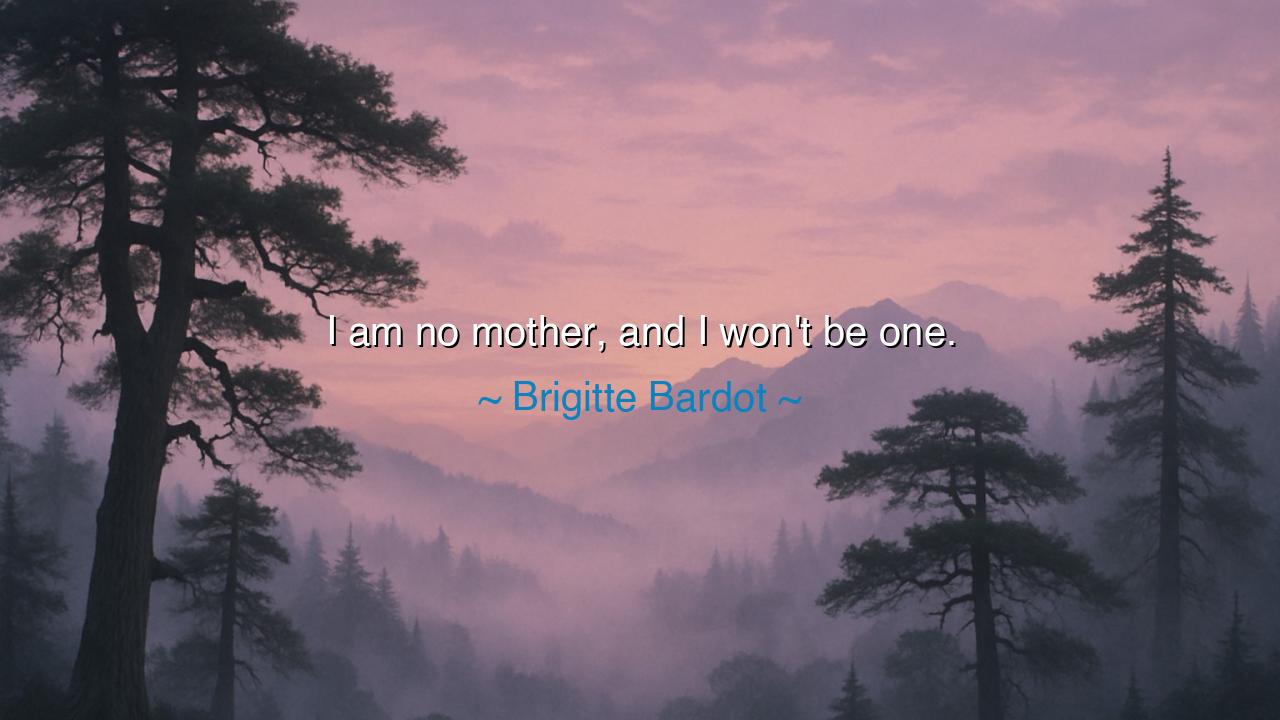
I am no mother, and I won't be one.






When Brigitte Bardot said, “I am no mother, and I won’t be one,” her words resounded not as a declaration of defiance alone, but as an act of honesty and self-awareness. In a world that so often prescribes a single destiny for women — to nurture, to bear, to mother — Bardot’s statement emerged like a spark in the dark, daring to illuminate another truth: that not all are called to motherhood, and that this choice does not lessen one’s womanhood, one’s worth, or one’s capacity to love. Beneath her simple phrasing lies a profound message about authenticity — the courage to know oneself and live according to that knowing, even when it contradicts expectation.
In the way of the ancients, such a statement would have been seen as a cry of the individual soul asserting its sacred right to determine its own path. Bardot, one of the most luminous figures of her time — admired, desired, and often misunderstood — did not utter these words in bitterness, but in clarity. Her life was filled with art, passion, and rebellion. She gave herself entirely to the craft of performance, to the beauty of animals, to the causes she believed in. To her, motherhood was not rejection, but recognition — the recognition that her spirit was meant to serve life in a different way. Like the Greek philosophers who sought truth not in conformity but in contemplation, Bardot’s wisdom was that of alignment: she chose to live as she was, not as others wished her to be.
The origin of this quote arises from Bardot’s reflections on her own life and the expectations imposed upon her. In her youth, she was seen as the embodiment of feminine beauty and sensuality, and the world watched her every move as though she were a goddess descended to earth. Yet such adoration can become a cage. As fame grew, so too did the demands — that she be perfect, nurturing, endlessly giving. Bardot’s refusal of motherhood was, therefore, a refusal to submit to roles that did not reflect her truth. She recognized that to bring a child into the world requires not only the ability to bear, but the will to give one’s soul over completely. She chose honesty over convention, truth over expectation — and in doing so, she lived the ancient commandment: “Know thyself.”
There is a lesson in her words that echoes across time. In the stories of old, there were women like Artemis, goddess of the hunt, who swore never to marry or mother, choosing instead the freedom of the wild; and women like Antigone, who defined love not through creation but through sacrifice. Each walked a path different from what society prescribed, and each revealed a facet of the divine feminine that is too often forgotten — the woman who protects, who creates through art or action, who nurtures not children but ideals. Bardot, like these mythic figures, reminds us that creation takes many forms, and that to refuse one form of creation is not to reject life, but to express it differently.
Her statement also carries an undercurrent of sorrow — the loneliness of honesty. For those who live in truth often walk apart. Society, especially in her time, was not ready to hear that motherhood could be a choice rather than a duty. Bardot’s courage invited misunderstanding and judgment, yet her example has since become a light to those who feel the same but fear to say it. She teaches us that to live with integrity means accepting that not all will understand you — and that is the price of authenticity. In this, her courage was not rebellion for rebellion’s sake, but an act of quiet self-respect.
There is also something deeply human — and humbling — in Bardot’s understanding of her own limits. She did not proclaim that motherhood was beneath her; rather, she confessed that it was beyond her. This humility is rare. The ancients taught that wisdom begins when one recognizes what one cannot do, what one is not meant to do. Just as a warrior who cannot heal must not become a physician, Bardot knew her heart was not fashioned for the ceaseless devotion that motherhood demands. By acknowledging this truth, she did not diminish the sacredness of mothers; she preserved it. For to choose motherhood without the will for it is to betray both mother and child — and to know oneself enough to abstain is, in its own way, an act of love.
So, my listener, let the lesson of Brigitte Bardot be one of courageous self-knowledge. The world will always try to tell you who to be, what to love, and how to live. But you must listen to the still voice within — the one that knows your truth. Do not mistake expectation for destiny. Whether your calling is to raise children, to create art, to protect the voiceless, or to seek solitude, honor it wholly. Live not half a life to please others, but a full life that reflects your soul.
For in saying “I am no mother, and I won’t be one,” Bardot spoke not in denial, but in truth — and truth, however difficult, is the only soil in which freedom can grow. To live authentically is to be at peace with who you are, and to let that peace ripple outward like a quiet, eternal blessing.






AAdministratorAdministrator
Welcome, honored guests. Please leave a comment, we will respond soon